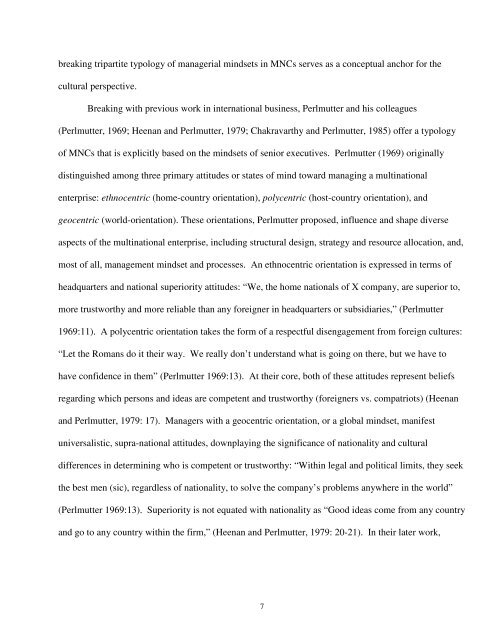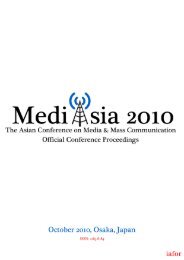What We Talk About When We Talk About “Global Mindset”
What We Talk About When We Talk About “Global Mindset”
What We Talk About When We Talk About “Global Mindset”
Create successful ePaper yourself
Turn your PDF publications into a flip-book with our unique Google optimized e-Paper software.
eaking tripartite typology of managerial mindsets in MNCs serves as a conceptual anchor for the<br />
cultural perspective.<br />
Breaking with previous work in international business, Perlmutter and his colleagues<br />
(Perlmutter, 1969; Heenan and Perlmutter, 1979; Chakravarthy and Perlmutter, 1985) offer a typology<br />
of MNCs that is explicitly based on the mindsets of senior executives. Perlmutter (1969) originally<br />
distinguished among three primary attitudes or states of mind toward managing a multinational<br />
enterprise: ethnocentric (home-country orientation), polycentric (host-country orientation), and<br />
geocentric (world-orientation). These orientations, Perlmutter proposed, influence and shape diverse<br />
aspects of the multinational enterprise, including structural design, strategy and resource allocation, and,<br />
most of all, management mindset and processes. An ethnocentric orientation is expressed in terms of<br />
headquarters and national superiority attitudes: “<strong>We</strong>, the home nationals of X company, are superior to,<br />
more trustworthy and more reliable than any foreigner in headquarters or subsidiaries,” (Perlmutter<br />
1969:11). A polycentric orientation takes the form of a respectful disengagement from foreign cultures:<br />
“Let the Romans do it their way. <strong>We</strong> really don’t understand what is going on there, but we have to<br />
have confidence in them” (Perlmutter 1969:13). At their core, both of these attitudes represent beliefs<br />
regarding which persons and ideas are competent and trustworthy (foreigners vs. compatriots) (Heenan<br />
and Perlmutter, 1979: 17). Managers with a geocentric orientation, or a global mindset, manifest<br />
universalistic, supra-national attitudes, downplaying the significance of nationality and cultural<br />
differences in determining who is competent or trustworthy: “Within legal and political limits, they seek<br />
the best men (sic), regardless of nationality, to solve the company’s problems anywhere in the world”<br />
(Perlmutter 1969:13). Superiority is not equated with nationality as “Good ideas come from any country<br />
and go to any country within the firm,” (Heenan and Perlmutter, 1979: 20-21). In their later work,<br />
7









